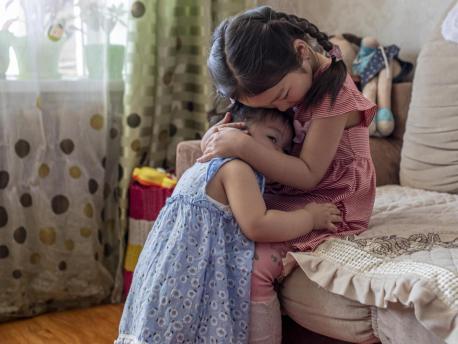
Working Together to End Racism Against Asian Americans
During this global crisis, it's more important than ever that we all remain in solidarity with one another.
See statement from UNICEF USA President and CEO Michael Nyenhuis
Last year as the pandemic began to rage, UNICEF USA published a statement, Another Danger of COVID-19: Discrimination, noting that as COVID-19 increased fear and anxiety across the world, discrimination and abuse of Asian Americans, fueled by misinformation and hateful rhetoric, were also on the rise. Victims included Bawi Cung and his 6- and 3-year-old sons, stabbed last March in a Sam’s Club in Midland, TX in a racially motivated attack.
While we may be making progress in the fight against COVID-19, we are not making progress on the attacks against Asian Americans. Stop AAPI Hate, a coalition that tracks incidents of violence and harassment against Asian Americans and Pacific Islanders, reported nearly 3,800 instances of discrimination against Asians in the past year. And now, we have news of the shootings in Atlanta that killed eight people, six of them Asian women.
UNICEF USA’s position is absolute: Fear and anxiety are never cause for racism or violence against any person. These attacks, and the racism and ignorance that fuel them, must stop.
Fear and anxiety are never cause for bigotry or violence against any person. These attacks, and the racism and ignorance that fuel them, must stop.
As we said last year, and reinforce now, during this global crisis it is more important than ever that we remain in solidarity with one another. We urge all UNICEF stakeholders to challenge discrimination and abuse against Asian American and Pacific Islander communities, and to counter the myths and misinformation that lead to racism and xenophobia.
In addition, we encourage decision-makers to engage Asian American youth to hear their perspectives, identify incidents of discrimination and abuse, and help generate inclusive solutions to deal with this pandemic. Resources that might help include this guide on preventing social stigma and UNICEF’s Voices of Youth website, which shares young people’s experiences of discrimination and abuse. UNICEF USA posted its own excellent story on Five Ways to Fight Racism and Xenophobia.
This battle against COVID-19 and against racism is not over. All of us must remain vigilant and engaged to protect one another.
Top photo: Gunjidmaa Nyambat, 5, hugs her little sister, 1-year-old Uuriintsolmon Erdenejargal, at their home in Murun, Khövsgöl province, Mongolia. © UNICEF/UN0339578/Babajanyan VII Photo
HOW TO HELP
There are many ways to make a difference
War, famine, poverty, natural disasters — threats to the world's children keep coming. But UNICEF won't stop working to keep children healthy and safe.
UNICEF works in over 190 countries and territories — more places than any other children's organization. UNICEF has the world's largest humanitarian warehouse and, when disaster strikes, can get supplies almost anywhere within 72 hours. Constantly innovating, always advocating for a better world for children, UNICEF works to ensure that every child can grow up healthy, educated, protected and respected.
Would you like to help give all children the opportunity to reach their full potential? There are many ways to get involved.





